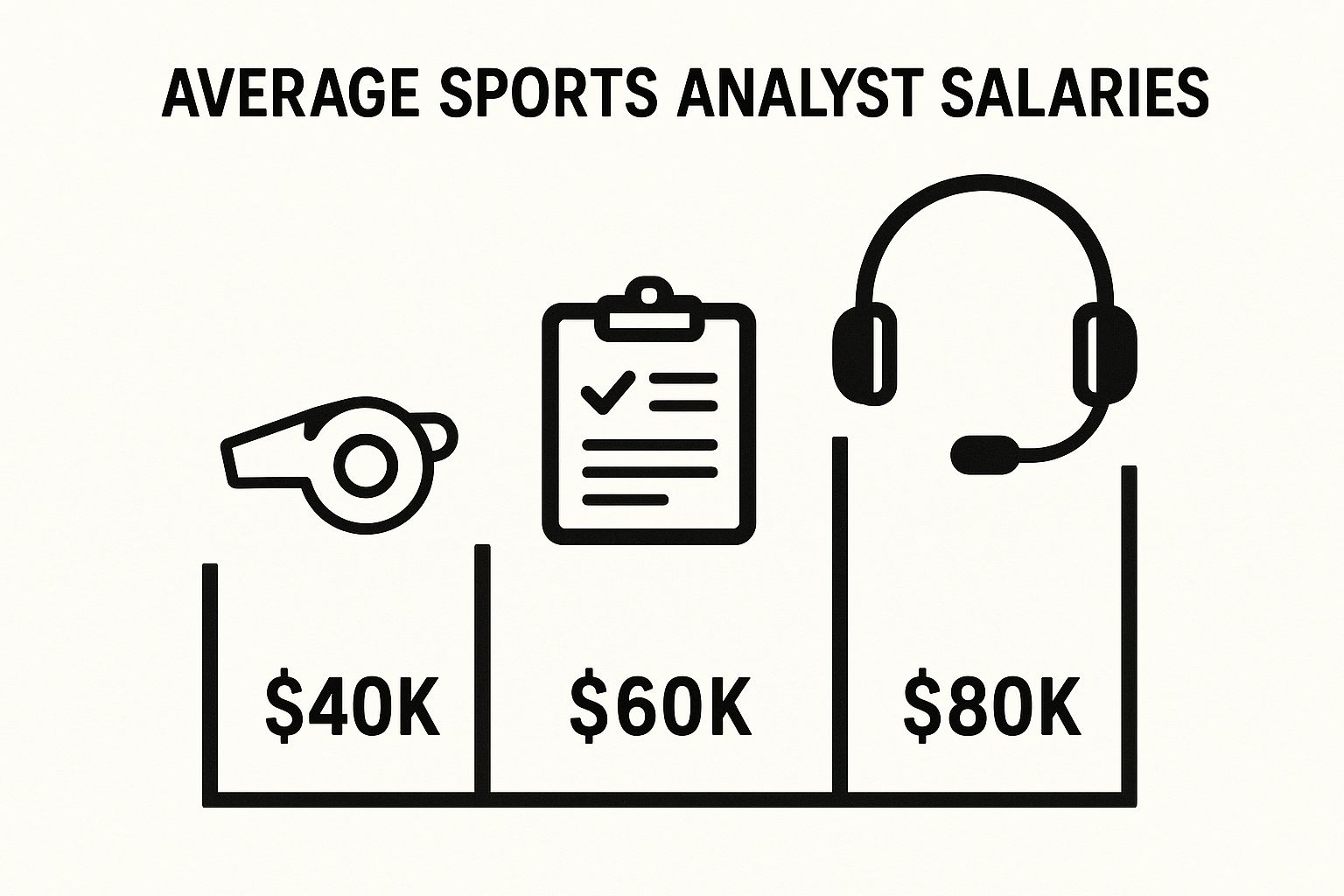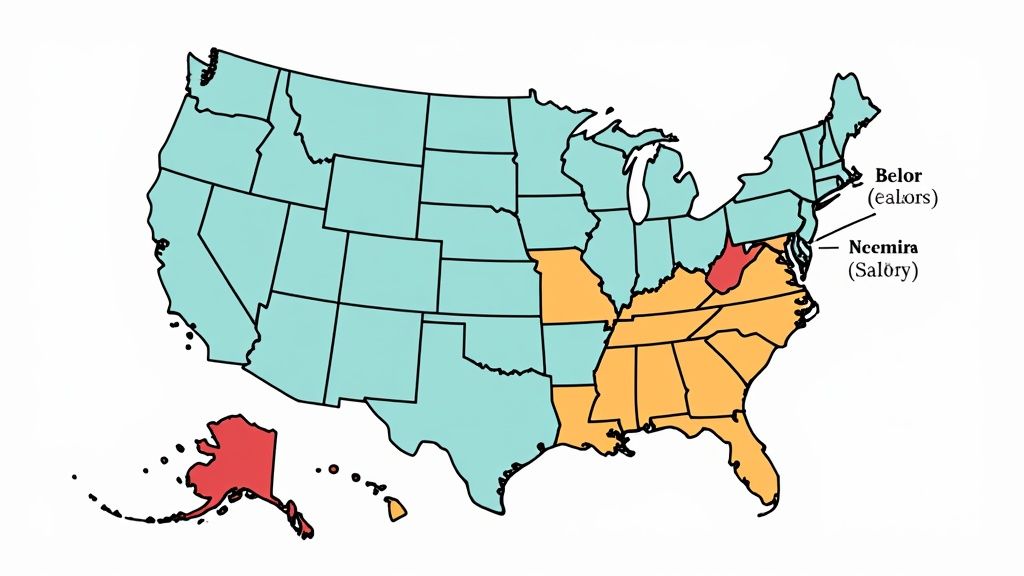
How Much Do Sports Analysts Make? Salary Insights & Tips
Let's get right to it: how much cash can you actually make as a sports analyst? The short answer is it varies, a lot. But to put a number on it, the average salary for a sports statistical analyst in the U.S. lands somewhere around $70,450 a year.
That said, averages can be misleading. Think of it like a batting average; it tells you something, but not the whole story of clutch hits and slumps. Entry-level gigs might start you closer to $30,000, while the heavy hitters in the industry can easily clear six figures, often pulling in well over $100,000.
What Is a Typical Sports Analyst Salary?
So, while that $70,450 figure is a good benchmark, most analysts don't earn that exact amount. Instead, you'll find most salaries fall within a specific range, one that really depends on what you bring to the table.
Most folks with a few years under their belt will see their annual pay settle in the $58,500 to $81,000 range. These are the analysts who have proven their worth and are consistently contributing to their organization's success. Broken down hourly, that’s about $33.87 per hour, which shows it's a solid career for people with the right mind for numbers and sports.
Curious to see what’s out there right now? It's always a good idea to check out live job boards to see how your skills stack up against current openings. You can explore current opportunities on www.sportsjobs.online and get a real-time feel for the market. You can also get more details on these salary ranges and how they're calculated.
To give you a clearer snapshot, here’s a quick breakdown of what you can generally expect at different stages of your career.
Sports Analyst Salary Snapshot
This table gives a quick overview of typical salary figures for sports analysts in the U.S.
| Pay Level | Annual Salary Range |
|---|---|
| Entry-Level (Bottom 25%) | ~$58,500 |
| Mid-Career (Average) | ~$70,000 - $81,000 |
| Senior/Top-Tier (Top 10%) | $105,000+ |
As you can see, the potential for growth is significant once you get your foot in the door and start making an impact.
The Financial Spectrum from Rookie to Veteran
The pay jump from a rookie analyst to a seasoned veteran is pretty dramatic, and for good reason. When you're just starting, you're likely focused on gathering data and running basic reports. But a senior pro? They're the ones building complex predictive models that influence multi-million dollar roster decisions.
The gap is real. A beginner might be looking at a salary around $30,000, but the top 10% of earners are commanding salaries north of $105,000 annually. Some even push past $117,500.
This huge range drives home a crucial point: your earning potential isn't set in stone. It's a dynamic number that grows as you gain experience, learn new tech, and build a reputation for delivering insights that actually help teams win.
Every new skill you add to your arsenal is like adding a new, game-winning play to the playbook, it makes you a more valuable asset to any organization.
How Experience and Education Shape Your Paycheck
Your journey in sports analytics is a lot like an athlete's career. Your paycheck grows as you move from a promising rookie to a seasoned veteran. In this field, how much you earn is tied directly to the value you bring, with experience and education being the two biggest factors.
Think of it like climbing a ladder. At the bottom rung, you're an entry-level analyst, probably fresh out of college with a degree in stats, data science, or even sports management. Your main gig is running basic reports and supporting the senior members of your team. As you get your feet wet and gain experience, you start to climb.
This progression has a real impact on your salary. For instance, analysts just starting out with 0-2 years under their belt typically earn between $50,000 and $60,000. After grinding it out for 3-5 years, that number bumps up to the $65,000–$75,000 range.
The image below gives a good visual of how salaries can ramp up with time in the game.

As you can see, sticking with it and sharpening your skills pays off over time. Literally.
From Mid-Career to Senior Leadership
Once you hit the senior analyst level, usually with about 6-9 years of experience, you’re looking at a salary between $80,000 and $95,000. At this point, you're leading projects, mentoring junior analysts, and providing the key insights that actually shape strategy. To see what kinds of senior-level jobs are available today, check out the listings on www.sportsjobs.online.
The real leap, though, happens when you move into management. Directors or managers with over a decade of experience can command salaries from $100,000 to $130,000 or even more.
These roles are about steering the ship, leading entire analytics departments, and having a direct say in major organizational decisions. If you're curious what a job like that looks like on paper, check out this job description for a Senior Manager in Data and Business Analytics to see the kind of qualifications they're after.
Key Factors That Influence a Sports Analyst Salary
So, you know the average salary range, but what actually moves the needle on your paycheck? Beyond your years on the job, a handful of variables play a massive role in figuring out how much a sports analyst really makes.
Not all analyst jobs are created equal. Where you work, the sport you cover, and the specific skills you bring to the table can dramatically shift your earnings.
Think about it like this: an analyst for a major NBA team in Los Angeles is playing in a different financial league than someone with the same title at a small college program in a rural town. Big league teams have massive budgets and much higher stakes. Naturally, they pay top dollar to get the best talent.
Want to see what employers are looking for right now? The best way to get a feel for the market is to look at active job listings. Check out openings on www.sportsjobs.online to see which skills are in demand across different sports and organizations.

Your Specific Skillset and Specialization
The tools in your analytical toolbox are a huge deal. Everyone expects you to know your way around a spreadsheet, but it's your specialized expertise that makes you a truly valuable hire. If you can build complex predictive models or design compelling data visualizations, you’re already in a much stronger negotiating position.
These advanced skills are what separate a good analyst from a great one. The more you can do with the data, the more you're worth to a team or organization.
Your value isn't just in crunching numbers; it's in telling a story with them. Skills like predictive modeling, data visualization with tools like Tableau, and proficiency in programming languages like Python or R directly translate to a higher salary.
This is especially true for roles that demand a deep understanding of statistical modeling. Jobs focused on advanced metrics and forecasting almost always come with a higher pay grade.
If you have a passion for this kind of deep statistical work, you should check out what a Quantitative Analyst position entails. It's a great example of how these specialized skills are applied in the real world.
Ultimately, understanding these factors helps you play the game smarter. By focusing on high-demand skills and targeting the right kinds of organizations, you can put yourself on the fast track to a much higher salary.
Without a doubt, your zip code plays a huge role in what you can earn as a sports analyst. It’s probably no surprise that the major sports hubs, the cities packed with pro teams and big media companies, are where you'll find the highest salaries.
Think New York, Los Angeles, and Chicago. These are the hotspots. Landing a gig with a major league team or a national broadcaster in one of these cities almost always means a bigger paycheck than you'd see for a similar job in a smaller market.
Of course, there’s a catch. That bigger salary in a major city often gets chewed up by a much steeper cost of living. A $90,000 salary in New York might not feel all that different from $70,000 in a midwestern city once you pay for rent and everything else. It's a classic trade-off you have to weigh when you're planning your next career move.
Where Are The Highest Paying Jobs?
Some states and metro areas just flat-out offer more lucrative roles. The best-paying jobs are almost always clustered where the big sports leagues, major universities, and broadcast giants have set up shop.
Location isn't just about a city; it's about access to opportunity. Being in a major market puts you in the same ecosystem as the biggest teams and media outlets, which naturally leads to more high-value roles.
If you're serious about maximizing what you earn, being willing to relocate can be a total game-changer. Thinking about making a move? A great first step is to see where the jobs actually are. You can check out www.sportsjobs.online to get a feel for which regions are hiring and what kind of opportunities are out there.
Let's Talk About the Pay Gap in Sports Analytics
We need to have a real conversation about something that's often overlooked: how demographics can impact what a sports analyst makes. While your skills and experience are what should matter most, the data shows that things like gender and ethnicity can, and do, factor into the equation. Knowing this isn't about pointing fingers; it's about making sure everyone has a fair shot at equitable pay.
First off, it's no secret that sports analytics is a male-dominated field. This has a direct impact on the pay structure. While the average salary for a sports analyst hovers around $76,155, men make up a huge chunk of the workforce, about 87.9%. What does that mean for women? On average, female analysts earn about 98 cents for every dollar their male colleagues make.
If you're trying to break into this world, it's worth seeing who's hiring and what the landscape looks like. You can always find the latest openings on sites like www.sportsjobs.online.
A Closer Look at the Numbers
The disparities don't stop at gender. When you slice the data by race and ethnicity, you see more variations that highlight just how much progress is still needed.
For example, looking at the data, you'll see Asian analysts earning around $75,334 and Hispanic or Latino analysts at about $76,948. Compare that to White analysts, who earn approximately $72,426, and Black or African American analysts, who make about $68,080 annually. If you want to dig deeper into these trends, you can explore more detailed demographic data for sports analysts to get the full picture.
Just being aware of these numbers is the first step. Whether you're just starting out or you've been in the game for a while, this information gives you crucial context. It arms you for salary negotiations and helps you plan your career path, making sure you're ready to advocate for the compensation you've earned based on your talent and hard work.
How to Increase Your Salary as a Sports Analyst
Knowing the average paycheck for a sports analyst is a great starting point, but let's be honest, the real goal is to actively boost your own. Climbing that salary ladder isn’t about dumb luck. It’s all about smart career moves.
This means you need to be proactive, whether you're negotiating your very first offer or stepping into a performance review to ask for a raise. The secret? Show them you're indispensable. If you want a quick pulse check on what the market is paying for right now, you can find a ton of job descriptions and salary expectations over at www.sportsjobs.online.

Build Your Long-Term Earning Potential
Beyond the quick wins in negotiation, your long-term strategy is what truly shapes your career path. If you focus on growing in a few key areas, you can seriously crank up your earning power over time.
Think of it as drawing up a roadmap to becoming the person they can't afford to lose. Here are a few solid strategies to consider:
- Go for an Advanced Degree: It's not always a must-have, but a master’s in data science, statistics, or a related field can unlock doors to senior roles with much bigger paychecks.
- Master the Right Tools: Excel is great, but don't stop there. Getting really good with programming languages like Python or R and data viz tools like Tableau makes you a far more compelling hire.
- Carve Out a Niche: Become the go-to expert in one specific thing. This could be anything from basketball player-tracking data and soccer's expected goals (xG) models to the finer points of performance science.
Becoming a specialist is one of the fastest ways to jack up your value. When you're one of only a handful of people who truly gets a complex area, you’re the one who gets to name your price.
This takes dedication, but it’s how you stand out. For instance, roles that blend analytics with sports science are popping up more and more, and they pay well. Just look at this opening for a Manager in Performance Science to see what a high-value, specialized role looks like. Don't forget to build your network, either, attending conferences and connecting with people in the field can give you a heads-up on amazing opportunities that never even get advertised.
Burning Questions About a Career in Sports Analytics
Jumping into any new field brings up a ton of questions, especially around what it really takes to get your foot in the door and what the future looks like. Let's dig into some of the most common questions I hear about becoming a sports analyst.
What's the Best Degree to Get?
Honestly, there's no single "perfect" degree. What really matters is having a rock-solid foundation in stats and a knack for making sense of data.
That said, you'll see a lot of successful candidates coming from fields like Sports Management, Statistics, Data Science, Mathematics, or Business Analytics. Think of these as different trails leading to the same mountaintop. They all equip you with the quantitative skills you need to succeed.
To really stand out, many analysts add specialized certifications in tools like Python, R, SQL, or data visualization software like Tableau. Mastering these tools is a surefire way to boost your earning potential down the road.
Can You Break in Without a Degree?
It's tough, but absolutely possible. If you're going this route, you can't just say you have the skills, you have to prove it. This means building an impressive portfolio of your own projects.
Maybe you start a blog where you publish deep-dive, data-driven insights into your favorite sport. Or perhaps you build your own predictive models and share the results. A portfolio that showcases your talent can often be more convincing than a diploma.
If you have the skills but lack the paper, finding the right opening is everything. Keep an eye on job boards like www.sportsjobs.online to see which teams and companies are hiring based on demonstrated ability.
A killer portfolio is your secret weapon if you're taking a non-traditional path. It’s concrete proof you can turn raw numbers into valuable insights, which is exactly what every employer is looking for.
What Does the Career Path Look Like?
Most people start out in a junior analyst or entry-level role. Here, you'll learn the ropes by focusing on things like data collection, cleaning, and basic reporting. It’s where you build your foundation.
Once you’ve proven yourself, you can move up to a senior analyst position. This is where you get to tackle more complex, high-impact projects and start to specialize.
From there, the path often leads into management. You could become a Lead Analyst, an Analytics Manager, or even a Director of Analytics. In these leadership roles, you're not just running the numbers anymore, you're guiding a team and shaping the entire data strategy for the organization.
Hundreds of jobs are waiting for you!
Subscribe to membership and unlock all jobs
Sports Analytics
We scan all major sports and leagues
Updated Daily
New jobs are added every day as companies post them
Refined Search
Use filters like skill, location, etc to narrow results
Alerts
You can get daily alerts in your email for a specific search
Access to job postings from top teams and companies
Daily updates and notifications based on your preferences
🎯 Over 90% of customers chose to renew their subscriptions after the initial sign-up
Monthly
$6.99
per month
✓ Flexible monthly billing
✓ Unlimited access to all jobs
✓ Advanced filtering tools
✓ Daily job alerts
✓ Exclusive discount codes
✓ Cancel anytime
BEST VALUE
Yearly
$39
per year • Only $3.25/mo
✓ Save 50% vs monthly
✓ Unlimited access to all jobs
✓ Advanced filtering tools
✓ Daily job alerts
✓ Exclusive discount codes
✓ Cancel anytime
Lifetime
$59
one-time • forever
✓ Pay once, access forever
✓ Unlimited access to all jobs
✓ Advanced filtering tools
✓ Daily job alerts
✓ Exclusive discount codes
✓ Best long-term value